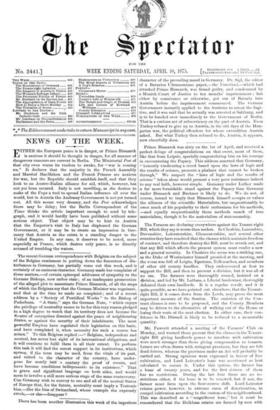The recent German correspondence with Belgium on the subject of
the Belgian remissness in putting down the fomenters of dis- turbances in Germany, has partially come out this week, and is certainly of an ominous character. Germany made her complaint of three matters,—of certain episcopal addresses of sympathy, to the German Bishops, now rather stale ; of an inadequate prosecution of the alleged plot to assassinate Prince Bismarck, of all the steps of which the Belgians say that the German Minister was cognisant, and that at the time he made no complaint ; and of a recent address, by a " Society of Pontifical Works " to the Bishop of Paderborn. "A State," says the German Note, " which enjoys the privilege of neutrality seems to be for this very reason pledged in a high degree to watch that its territory does not become the Satre of enterprises directed against the peace of neighbouring States, or against the security of their inhabitants. The most powerful Empires have regulated their legislation on this basis, and have completed it, when necessity for such a course has arisen." To this Belgium replied :—" Belgium, independent and neutral, has never lost sight of its international obligations, and it will continue to fulfil them in all their extent. To perform this task it will find the surest support in its institutions, which sprang, if he term may be used, from the vitals of its past, and suited to the character of the country, have under- gone for nearly half a century the proof of events, and have become conditions indispenaable to its existence." That is grave and significant language on both sides, and would seem to involve a still more serious stage of the same controversy. Can Germany wish to convey to one and all of the neutral States of Europe that, for the future, neutrality must imply a Teutonic bias,----like the bias of Switzerland, whose example she expressly extels,--or else—disappear?


































